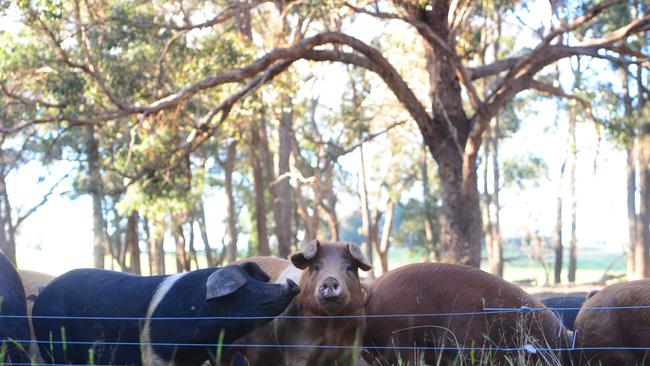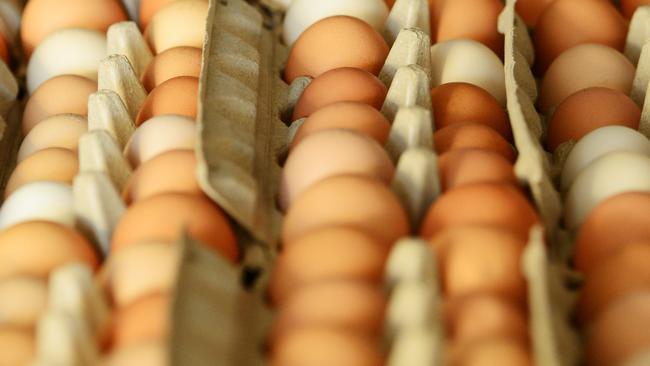CARS creep up the dirt drive.
About 100 vehicles are bumper-to-bumper on Ben Falloon’s 162-hectare Woodend farm.
“The tour today will take at least two hours,” Ben says as he greets motorists at the gate, while his father, Stan, musters drivers into a paddock. Ben’s nine-year-old daughter, Maya, is patiently nodding to each of the 230 visitors as they roll by.
“Maya raises fancy chickens and will be selling some next to the shed after the tour,” Ben says, as an introduction.
Judging by the traffic jam, Maya and her chickens aren’t the only interesting things to see on the tour of Taranaki Farm today.

In fact, the 230 visitors traipsing across Ben’s paddocks are integral to his business plan. He opens Taranaki Farm’s gates about 10 times a year for tours.
“We are definitely encouraging people to be engaged,” Ben says, explaining the aim of the tours. “I talk about slaughter, castration and everything else. I don’t want to be a petting zoo.”
Taranaki Farm certainly isn’t one of those. It is a multi-enterprise operation 80km north of Melbourne run by single dad Ben with help from his parents, Stan and Robyn, daughters, Maya, 9, and Maggie, 6, and farmhands, Tash Vermaak and Jemma Parker. Together they raise free-range pigs, broiler chickens, free-range chooks, Angus cattle and a couple of Jersey cows.
Ben has been running the family property since about 2005, when he traded a career in IT for agriculture. He calls his approach “beyond organic”, with a strong focus on animal husbandry and regenerating soil and pasture using rotational grazing, compost and animal manure.
“I would like to set up our operation so it regenerates the landscape,” Ben says to tour-goers. “We don’t believe in organic certification. We invite you to walk the land. Your being here certifies what we do.”

Each Sunday tour averages about 150 people, “but we have had up to 750 in a day,” Ben says. Adults pay $25 each. It doesn’t take much to work out that even 1000 tickets a year returns a healthy sum.
Ticket sales are the farm’s third largest money spinner, behind egg and meat sales. With more than 30,000 followers on Facebook, social media is the only place Ben advertises the tours. He posts. People share. Then the crowds just roll up. He built this online following the same way he built his multi-enterprise operation: through trial, error and transparency.
EARN THEIR KEEP
Eggs are the main income-earners on Taranaki Farm.
Ben built two giant A-frame “eggmobiles” using reclaimed materials and timber milled on the farm. The eggmobiles house 2000 Australorp, Isa Brown and Leghorn chooks and are moved twice a week, shifted across pasture following the cattle to help fertilise soil. Ben sells eggs wholesale to restaurants and cafes in the Macedon Ranges and northern suburbs, as well as through local IGAs and his farm shop, for $8.50 a dozen.
Ben also runs pastured pigs, with 15 Wessex and Saddleback sows crossed with a Wessex-Duroc boar. Each sow averages about two 10-piglet litters a year.
Life while on the farm is fine for these pigs. They are kept in social groups, graze pasture, root through the forest, dig for witchetty grubs, wallow in mud and receive a cracked grain feed mix daily. In return, they aerate and turn over the soil.
“The by-product is the most amazing pork you can imagine,” Ben says.
After processing at Diamond Valley Pork, Ben and Tash butcher the carcasses and cryovac the meat in their boning room. They sell cuts after tours, for about $21 a kilogram.
About 750 broiler chickens — the Ross 308 breed — are Ben’s most recent additions.
“They are bred to be couch-potato eating machines,” Ben says. “They eat twice as much as a layer and at about seven weeks old are ready to go.”

Birds are bought as day-old chicks in batches of 250 once every three weeks. They go under heat lamps for three weeks, then move to mobile shelters — six polycarbonate-cladded pens that protect 60 birds apiece. Every day, the shelters are stocked with broiler feed mix and water, and shifted one length to allow the birds free access to fresh pasture and grubs.
“One pen of chickens produces the same volume of protein over five to six weeks as a steer produces in two years,” Ben says. “They are good for a small farming operation that needs to produce a large amount of protein in a small amount of time.”
Ben sells whole birds for $14 a kilogram; breast fillets sell for $26 a kilogram.
As for the farm’s Angus cattle and Jerseys, they are glorified lawn mowers.
AMERICAN IDOL
Ben’s entire set-up and “beyond organic” approach may sound familiar.
His broiler chickens, pastured pigs, A-frame hen houses, farm tours — even his engaging tour chitchat — are based on the approach of US regenerative agriculture guru Joel Salatin, who runs Polyface farm in the Shenandoah Valley in Virginia.
Salatin has been proselytising about regenerative agriculture and local food economies for the past 20 years.
In 2010, a few years after Ben started farming, he and a group of like-minded producers organised seminars at Woodend, and brought in Salatin as a speaker.
“I wanted to know what I was doing wrong,” Ben says. “All I could see was a trail of mistakes. Everyone came here — it was like a French salon. Being at the nucleus, I was listening to what Joel and others were saying and wondering why the approach wasn’t more popular and why people weren’t rushing to join the movement. I made it my personal mission to popularise it.”

Ben shares his progress on social media and his followers are captivated.
“I just decided I would share the story,” Ben says. “We would post a paragraph of text and a picture, and developed a core of loyal followers. Because Facebook is largely full of rubbish, our posts would just pop out as reality.”
Ben says it has been hard work adapting Salatin’s local-economy model to the Australian landscape, climate and laws, including local council restrictions and PrimeSafe regulations.
“Our legislative context is much more prohibitive than his,” Ben says, “as amazing as that sounds given he is the guy who wrote Everything I Want to Do Is Illegal.”
CLEAR SIGHT
During Ben’s tour, people quiz him about the nitty-gritty of his production processes, including how his pigs are slaughtered.
He answers honestly: carbon dioxide gas. Ben takes pigs to the abattoir at about eight months of age, or 90kg, and aims to minimise stress so the animals are calm when they walk into the gas chamber.
In answer to another question: yes, they do castrate males at about three days old. The reason, Ben says, is to avoid boar taint — the unpleasant taste that can be evident in pork from non-castrated male pigs.
None of this information puts people off. After the tour, buyers clear all the pork and chicken out of Ben’s chillers. Maya has a profitable day, too, and packs her chickens into crates for visitors to take home.
This year, Ben plans to build an on-farm poultry processor in a shipping container and document the build so it can be replicated by other farmers. He also plans to sell through an annual subscription model.
Meanwhile, he and his family will continue to grow his local customer base at Woodend.
“To look after the land, you have to run livestock to fertilise that land,” he says. “But to have animals here, you have to have customers, and they have to be local.
“A lot of our success is about the community. A healthy community will support the farmers they know.”

SETTLEMENT PLAN
TARANAKI Farm has been in Ben’s family since 1923 when his great-grandfather John, a World War I soldier-settler, ran it as a mixed operation with market garden, potatoes and dairy.
“I remember charging around the farm on a motorbike when I was young, running into things I shouldn’t have,” Ben says. “What stressed my grandfather, Jack, out the most was when I turned vegetarian.”
His grandfather’s bigger stresses back then were competition and lean prices. After Jack wound up the market garden, the Falloon family ran beef on the property.
Ben’s tenure started about 2005, when he came back to Woodend to take a break from his IT career.
“It was mid-drought,” Ben says. “I was sitting in front of my computer on the farm, looking out the window at the land. I thought I wanted to do something with it.
“Up to 2010, there was only one species of grass growing here, and it only grew for one and a half months of the year.”
Since then, the 40-year-old has been working to regenerate the land and create an agricultural business that can sustain his family.
“Now we are moving toward a polyculture of diversity,” he says. “My only regret is that I started farming after my grandfather died.”
2018 TARANAKI FARM DISCOVERY TOURS
March 24, April 29, May 26, September 1, September 3, October 27, November 18
taranakifarm.com.au


Add your comment to this story
To join the conversation, please log in. Don't have an account? Register
Join the conversation, you are commenting as Logout
Seaweed offers new wave of feed
Dairy cattle on a seafood diet? A seaweed supplement is making a big difference to methane outputs in Tasmania.
Quality, not quantity the key to success
When it comes to award-winning crops, plant health is everything, as these Kyabram brothers can attest.